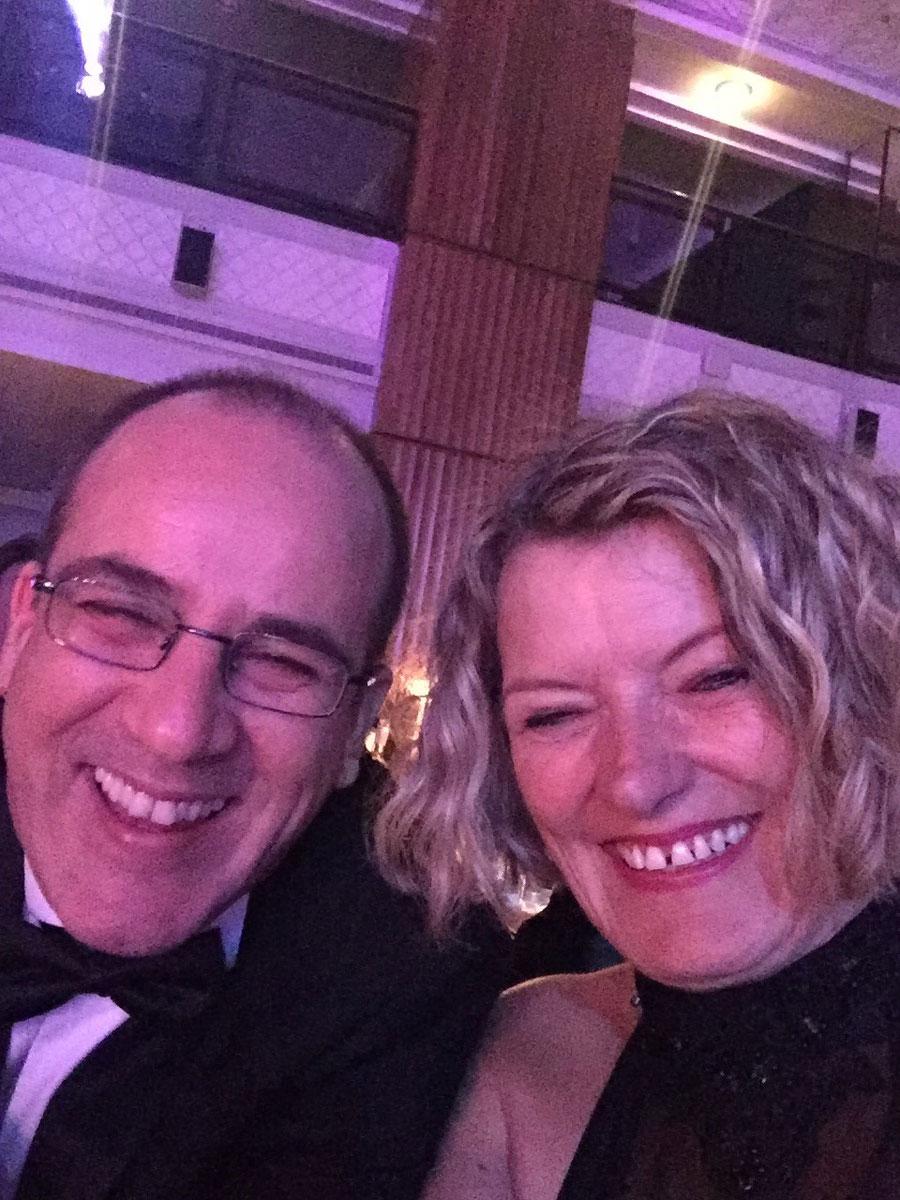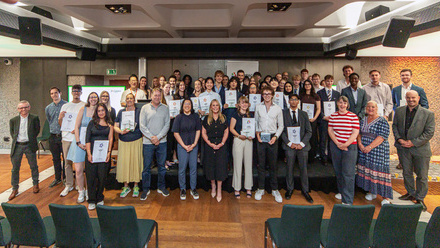Lasting Legacy – Mark Caul’s packaging impact
Mark Glover speaks to Tesco’s Denise Mathieson FIMMM about the contribution of her work partner.

When Denise Mathieson joined Tesco in 2015 as Packaging Manager, her new colleague Mark Caul was a well-known name in the industry. ‘I’d heard about him, spoken on the phone, but we’d never actually met,’ she says. ‘Everybody said you need to meet Mark, so I dropped him an email.’
And her first impressions? ‘Incredibly scruffy,’ she laughs.
From that point, the pair became close colleagues and great friends – together, making marked changes at Tesco that filtered out to the wider sector. However, in March 2019, Mark died unexpectedly from a heart attack aged just 50.
As Tesco won both sustainable supermarket of the year and development team of the year at the UK Packaging Awards in 2020, Denise and many of Mark’s peers believe the two awards are recognition of his work.
Earlier this year, I spoke to Denise to get a sense of his legacy – one forged in innovation and a strong inclination to simply do the right thing.
Colourful thinking
It was three hours in a meeting room, at Tesco’s head office in Welywn Garden City, UK, where Mark and Denise thrashed out a concept.
Tesco’s JAZZ rPET project began life as a seed of an idea. As was often the case, Mark brainstormed the theory with Denise, who instantly spotted the potential, determined to add meat to the bones. ‘We literally went and locked ourselves away in a room,’ Denise tells me. ‘I said, ‘We are not leaving until I understand what you’re talking about, and once I get it, then I can explain it to everybody else.’
At the time, all major supermarkets had stopped using black food packaging made using carbon black, as recycling facilities were unable to detect the material. But while many opted for clear material, Tesco was still hanging on, a stand which had two motivations – one, food looks aesthetically pleasing in black packaging, and two, a commitment to sustainability.
Around 14,000t per week of coloured and black plastic is shipped from UK shores, and Mark and Denise felt, having contributed to these figures, it couldn’t be ignored. ‘We felt we had a moral responsibility. We’d used coloured rPET for years, so to walk away and leave it as a problem for somebody else didn’t feel right,’ Denise explains.
Mark’s idea was a food-safe black plastic tray using recycled coloured jazz flake, which still had complete detection in the recycling stream.
Fast forward, and the specification Denise developed from Mark’s vision has been adopted by the UK Plastics Pact as what ‘good looks like’, and with Tesco large enough to drive its own end market for the coloured flake, the product was rolled out across its meat and fish categories in April 2020.
‘I’m super proud that I was able to land it for him, because I know how important he thought it was,’ she says.
Finding a synergy
Denise stops mid-flow as the doorbell sounds, signalling the arrival of two furniture delivery men. She’s two weeks into a move to her new house in Essex – the building of which she project managed herself. She still has the spreadsheet that her and Mark poured over to crunch the numbers until the dream became a reality.
I see Denise guide the piece into position, instructing the two workers. I perhaps get a glimpse of her project management skills, making me think that her comment about just ‘landing’ the JAZZ rPET project is underplayed.
Furniture in the perfect position, we pick up the conversation and I ask about her working dynamic with Mark. ‘He taught me a lot and I taught him a lot, but there was also a bit of competition too, a friendly rivalry,’ she says.
She recalls a conversation around laminates and oriented polypropylene (OPP), their role and the complexity in making such packaging recyclable. ‘I said, 'we’re going to have to make flow wrap out of polyethylene (PE) rather than OPP'. He told me it wasn’t possible. I said, ‘Leave it with me.’’ At the next Packaging Awards, Denise won an award for her PE flow wrap. Affirmation indeed.
Their skills, while different, intertwined perfectly. Mark’s innovative ideas were honed, refined, explained and often communicated by Denise – a trait recognised by her friend’s nickname for her, the 'Queen of simplification'.
‘We were polar opposites,’ she says, ‘but we just clicked. I was always far more vocal and outgoing, and he was always in the shadows in the office…it wasn’t because he lacked confidence…everybody in Tesco knew him, everybody respected him, he was a little bit like a mad professor.’
Think mad professor and you think of new ideas that push the envelope. Denise explains that Mark’s work both at Tesco and during 10 years at Marks & Spencer are still recognised as significant shifts in the food packaging sector. Most notably, he was instrumental in leading Marks & Spencer’s ambitious Plan A strategy – a list of 100 targets built around five key pillars including waste.
At Tesco, he was one of the original architects of the firm’s packaging strategy, which included its own label and branded preferred materials list, which categorises materials as red, amber or green (RAG) based on how recyclable they are.
The RAG packaging strategy, alongside the JAZZ rPET project, formed part of the submission for the 2020 Packaging Awards, alongside the Remove and Reduce, Reuse and Recycle programme to govern design around packaging, and a trial to recycle soft, flexible plastic packaging into safe food-grade material using pyrolysis.
Ideas between Mark and Denise would take shape in the early morning – he would often call her on his way into the office.
Support would also cross international borders. In 2018, Denise went to Brazil solo to carry out a cradle-to-grave audit on sugar cane PE. Of course, she had carried out a number of audits before, but not on ethical processes incorporating child labour and human rights. Typically, Mark was there to offer help. ‘He came to my house, and brought all his manuals on ethical audits, everything that I could possibly ever need to know and sat down and walked me through it.’
The trip lasted for 10 days, criss-crossing the cavernous country in challenging environments. Brazil, while beautiful, can be dangerous in places. ‘He was ringing me all the time…even on those trips, we were always supporting each other.’
Taking a stand
Denise retains a confidence fuelled in part by Mark’s influence but also her own resilience, abilities and genuine hard work. She’s aware that people perceive her as one of the voices of Tesco and she embraces this role – both influencing the sector and being a prime target for criticism.
Difficult conversations with other packaging stakeholders must be par for the course. ‘I’m more than confident to tell them how everybody should be aligned,’ she says.
‘As well as taking on any feedback or criticism. I guess it’s that simplification approach again, I’ve had to grow in confidence where before I would have just left it to Mark. But now they listen to me and I listen to them.’
In 2020, her mettle was tested. Tesco’s preferred materials list, published originally in 2018 as part of its wider packaging strategy, was updated and it fell to Denise to inform the sector of the firm’s decision to put compostables and biodegradables on the red list.
Despite fear of a backlash, Denise was galvanised in the fact it was the right decision following a trip to an anaerobic digestion plant, where workers removed unrecyclable caddy liners used to hold the compostable and biodegradable material. ‘So, for that reason, I was more than happy to say no, we’re not having it,’ she pauses, ‘well not until UK infrastructure can process it.’
Delivering the outcome to a room full of packaging professionals threw up self-doubt but a resilience kicked in. ‘I quite like being challenged, so I thought, I can’t wait for the Q&A.’ She needn’t have worried as the room agreed with the move, and the stance is now generally accepted across the supermarket sector.
Before taking to the stage, however, Denise had to conquer another fear – an aversion to public speaking which was put into perspective following Mark’s funeral. ‘Every time I speak in public, I remember reading Mark’s eulogy as the toughest gig ever – anything else is now child’s play.’
Our conversation naturally curves towards the future as the UK heads towards net-zero and a raft of legislation around plastic is due.
The company’s approach, she explains, is to balance recycling and production methods with the bottom line. The firm has brought in board packaging – admittedly much less than other retailers due to the numbers and the results of life-cycle analysis.
Looking forward
Denise received her IOM3 fellowship just after Mark passed away, an accolade she’s proud of and one Mark was pushing her to achieve – he was a Fellow of the Institute himself and active member of the IOM3 Packaging Society.
Following Mark’s passing, the community stepped up. ‘They reached out to me,’ Denise says. ‘I think people realised I had lost my mentor.’
His desire to nurture, pass on information and ultimately guide and help people in their careers is a key tenet of his legacy, Denise reflects. ‘Mark had a brilliant mind that was full of ideas and knowledge, knowledge that he loved to impart on others, to empower them to do good. He was more than just a nutty professor (although he was definitely that), he was a compassionate and caring human being, he was funny – he was so funny – sometimes we laughed so much we actually cried.
‘He was passionate about sustainability but he had other passions too – he was obsessed with Dr Who, and had a room stacked to the rafters with memorabilia. My final gift to Mark was the urn his ashes now reside in – fittingly it is a Tardis. I miss him everyday.’







